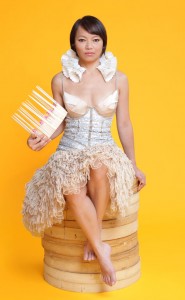Australian Theatre Forum 2013 | Friday (Before Lunch)
- June 10th, 2013
- Posted in ATF 2013
- Write comment

And the last day of the ATF and Jane and I were at it again: first up a Keynote from a former-performer now entrepreneurial restauranteur: MissChu… that’s right… this one you can find HERE
KEYNOTE: NAHJI CHU
MissChu, Queen of Rice Paper Rolls, speaks about her own approach to what’s not possible and breaking the rules.

For an overview of the Keynote check out Jane Howard’s blog HERE
This like so many stories about successful people and businesses is about being determined, stubborn and innovative – and by innovative i think it is important for me to make the distinction that I do not mean “novel.” (The key difference being “an innovation and a novelty is that an innovation solves an important, unmet need and a novelty does not.”) Despite having so much prepared, Misschu changed her presentation to suit the room. (The lesson? Adapt. Adapt. Adapt)
And what can a room full of Australia’s theatre practitioners learn from a tuck shop business?
Oh ho! The lessons are major and many:
The personal is everything. The personal is political. The political is also professional.
“As an adult I became a pho seller & I decided I would tell the history of the vietnamese community through food.”
(A refugee who entered the country with nothing has created something. And she is here (in Australia) and her food is in Sydney because of her. The fact that she is here has direct relationship to her political asylum. The story, her life is wrapped up into one
Be your own boss.
(After watching her grandmother (and fighting with her) as a young girl, Misschu saw an easier and better way to run a business – gave up trying to change her grandmother – and did it herself)
Don’t pander to ego.
“You either hate me for invading your suburb or you embrace me”
(It didn’t matter who she was serving – she was just serving as efficiently as possible – when she got a reputation for being curt – she made that a part of her brand – that’s how she is – food comes first – uncompromisingly so. The confidence comes in her product – and like OkRadio had shown us previously, perhaps we worry a little too much about our reputation? Perhaps being unapologetic about standards is everything.)
Invest in what you believe in.
“I’m just not into materialism – I came in with nothing and I’ll leave with nothing – collecting material possessions is not creative.”
(Misschu started her business with $1500 and now turns over $20 million a year)
Businesses that succeed brand for 18-30 year olds.
(Youth audiences and engagement anyone? How often are the 18-30 year olds treated as “youth” not as important participants – the future of audiences rely on young people)
It’s not all up to you to do it all or be it all.
“Delegate! Delegate! Delegate! And trust your staff”
(Knowing what to surrender and what to control: the lesson is to make sure everyone is aware of your standard and of their role in maintaining the standard of the company)
Complacency is the death of relevance.
“I don’t think you can nail anything & I wouldn’t be so complacent to say that you can”
(As demonstrated in her opening address, Misschu chose adaptation to forging ahead with what she prepared. She chose to open with social media engagement – there was no complacence there – that us: sympathetic left wing artists could listen and engage with her first thing on a Friday morning: Context is everything. And complacency will drown you.)
PANEL: FESTIVAL DIRECTORS THE CHANGING NATURE OF AUSTRALIAN FESTIVALS – OR NOT?
Chair: Wesley Enoch; Speakers: Robyn Archer, Jo Duffy, Jonathan Holloway, Edwina Lunn, David Sefton, Noel Staunton
For full details, best refer to Jane Howard’s blog HERE or to check my Twitter stream of search #FestivalDirectors
Interestingly the across country festival landscape was diverse and as compelling festivals themselves: some looking to showcase the bizarre and the unusual, others keen to showcase local talent. In all instances the role of the “festival” as an audience development (not only in numbers but in the development of artistic literacy/engagement) was key.
Curatorial vision was up to the individual festival director’s programming style – and a wide and enthusiastic support of “fringe festivals” as places to develop artists, content and were seen as potential places to source Festival material (not competition for the major festivals). Of course the language of the “artistic eco-system” continued and we were reminded of the importance to be restless in our art-making.